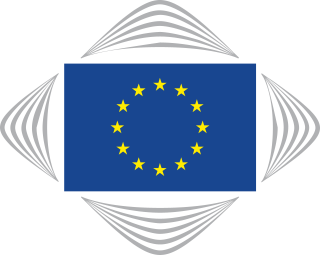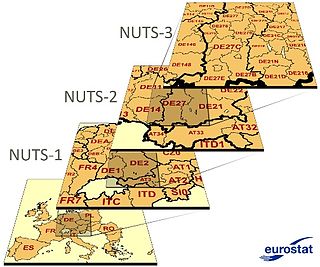
The European Union (EU) is a political and economic union of 27 member states that are located primarily in Europe. The union has a total area of 4,233,255.3 km2 (1,634,469.0 sq mi) and an estimated total population of about 447 million. An internal single market has been established through a standardised system of laws that apply in all member states in those matters, and only those matters, where the states have agreed to act as one. EU policies aim to ensure the free movement of people, goods, services and capital within the internal market; enact legislation in justice and home affairs; and maintain common policies on trade, agriculture, fisheries and regional development. Passport controls have been abolished for travel within the Schengen Area. A monetary union was established in 1999, coming into full force in 2002, and is composed of 19 member states which use the euro currency. The EU has often been described as a sui generis political entity with the characteristics of either a federation or confederation.

The European Committee of the Regions (CoR) is the European Union's (EU) assembly of local and regional representatives that provides sub-national authorities with a direct voice within the EU's institutional framework.

The languages of the European Union are languages used by people within the member states of the European Union (EU).

Nomenclature of Territorial Units for Statistics or NUTS is a geocode standard for referencing the subdivisions of countries for statistical purposes. The standard, adopted in 2003, is developed and regulated by the European Union, and thus only covers the member states of the EU in detail. The Nomenclature of Territorial Units for Statistics is instrumental in the European Union's Structural Funds and Cohesion Fund delivery mechanisms and for locating the area where goods and services subject to European public procurement legislation are to be delivered.

The special territories of the European Union are 32 territories of EU member states which, for historical, geographical, or political reasons, enjoy special status within or outside the European Union.

The economy of the European Union is the joint economy of the member states of the European Union (EU). It is the third largest economy in the world in nominal terms, after the United States and China, and the third one in purchasing power parity (PPP) terms, after China and the United States. The European Union's GDP was estimated to be around $15 trillion (nominal) in 2020, representing around 1/6 of the global economy.

The European Research Area (ERA) is a system of scientific research programs integrating the scientific resources of the European Union (EU). Since its inception in 2000, the structure has been concentrated on European cooperation in the fields of medical, environmental, industrial, and socioeconomic research. The ERA can be likened to a research and innovation equivalent of the European "common market" for goods and services. Its purpose is to increase the competitiveness of European research institutions by bringing them together and encouraging a more inclusive way of work, similar to what already exists among institutions in North America and Japan. Increased mobility of knowledge workers and deepened multilateral cooperation among research institutions among the member states of the European Union are central goals of the ERA.
The larger urban zone (LUZ), or functional urban area (FUA), is a measure of the population and expanse of metropolitan areas in Europe. It consists of a city and its commuting zone.

The Directorate-General for International Partnerships is one of the departments of the European Commission. It operates under the authority of the European Commissioner for International Partnerships, Jutta Urpilainen.

Daciana Octavia Sârbu is a Romanian politician, legal counsellor, and Member of the European Parliament.

The European Union itself does not issue ordinary passports, but ordinary passport booklets issued by its 27 member states share a common format. This common format features a coloured cover emblazoned—in the official language(s) of the issuing country —with the title "European Union", followed by the name(s) of the member state, the heraldic "Arms" of the State concerned, the word "PASSPORT", together with the biometric passport symbol at the bottom centre of the front cover.

Peri-urbanisation relates to those processes of dispersive urban growth that create hybrid landscapes of fragmented urban and rural characteristics.

Enikő Győri is a conservative Hungarian politician and elected Member of the European Parliament (MEP) with Fidesz, part of the European People's Party.

Kriton Arsenis, environmentalist, and MP in the Greek Parliament. He is a former Member of the European Parliament (MEP) (2009-2014).
The Turkey-EU Joint Parliamentary Committee (JPC) is established on the basis of the European Parliament’s resolution of 14 May 1965 and the resolutions of the Turkish National Assembly and the Turkish Senate, adopted respectively on 22 June and 14 July 1965, and on the basis of the decision of the European Economic Community-Turkey Association Council of 27 July 1965.
The evolution of motorways construction in European countries by total number of kilometers existing in that year. This is a list of the total number of Motorways by country in Europe. It includes motorways, classified as such by the Eurostat and includes countries that are not members of the European Union but geographically are situated in Europe.
A Sustainable Urban Mobility Plan (SUMP) is a planning concept applied by local and regional authorities for strategic mobility planning. It encourages a shift towards more sustainable transport modes and supports the integration and balanced development of all modes. A SUMP is instrumental in solving urban transport problems and reaching local and higher-level environmental, social, and economic objectives. Sustainable Urban Mobility Plans are defined as "a strategic plan designed to satisfy the mobility needs of people and businesses in cities and their surroundings for a better quality of life. It builds on existing planning practices and takes due consideration of integration, participation, and evaluation principles.”

Passports of the EFTA member states are passports issued by the European Free Trade Association (EFTA) member states Iceland, Liechtenstein, Norway and Switzerland. EFTA is in this article used as a common name for these countries.

Patrick Breyer is a German digital rights activist, jurist, Pirate Party Germany politician, and – since 2019 – Member of the European Parliament (MEP). From 2012 to 2017 he was a member of the state parliament of Schleswig-Holstein and from April 2016 until the end of the legislative period he was also the leader of the Pirate group in that assembly. Breyer is one of four European Pirate Party MEPs in the 2019–2024 term along with three Czech Pirate Party members, all of whom are members of the Greens / EFA parliamentary group.